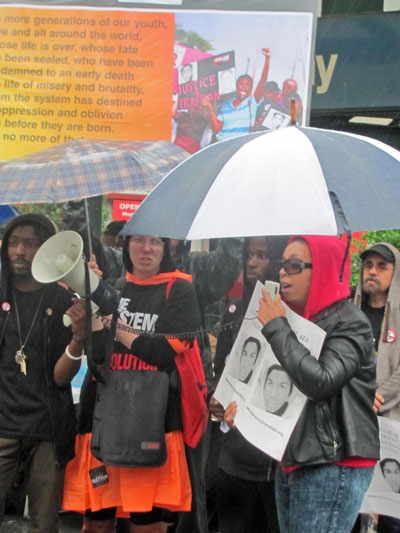Harlem and Union Square in NYC:
Determined and Defiant Protesters Demand JUSTICE for Trayvon Martin
June 9, 2013 | Revolution Newspaper | revcom.us
"I don't want to live in a world where this happens, and keeps happening. Whenever something like this happens, the rules are bent so they don't work for Black people… I don't want to live in a world where we have to protest for justice—why can't there just be justice?" —A 14-year-old woman telling Harlem protesters why she was there

New York, Union Square, June 10. Photo: Special to Revolution
On the eve of the first day of the trial of George Zimmerman for the murder of Trayvon Martin, a powerful storm drenched New York City with rain that at times reached torrential levels that sent pedestrians running for cover. In spite of this, and in the face of large police presence, a total of about 100 people came out to demand justice for Trayvon, over the course of about three hours of protests that were organized by the Stop Mass Incarceration Network (SMIN).
First in Harlem and then later at historic Union Square, people spoke bitterly about the murder of Trayvon, and how it related to the never-ending and ever-escalating oppression that Black people face throughout the U.S. People spoke of their anger and their fears, but also of their pride in standing up with others to fight it, and their determination not to back down.
- A middle-aged Black professional woman in Harlem said, referring to a dramatic life-size cutout of Trayvon, said: "When I look at this image it makes me think of my sons and of my grandsons. And I'm afraid for my sons. We cannot let him [Zimmerman] walk away from this, or it's like saying that anyone can kill one of our kids on the street and walk away." Another woman from Harlem, speaking at Union Square, raised that she feared a genocide directed at Black men.
- A young Black man at Union Square said, "I'm here because Trayvon could have been me, he could have been any of my friends, he could have been anyone I know."
- A youth in Harlem who is active with the Revolution Club said "I'm a student, and when I leave my college they stop me for no reason. It makes me afraid for my little brother and sister."
- A young black Hispanic man at Union Square said that friends asked him if he wasn't scared going out in the street in a hoodie [because the police or racists would target him] and he told them, "I'm scared in a hoodie, I'm scared in shorts—I'm scared any time I might have an encounter with the police." And he went on to say that he was glad to be working with SMIN to fight this.
In Harlem people rallied in St. Nicholas Park and got out stickers saying "We Are All Trayvon Martin/The Whole System Is Guilty" to over 50 high school students who were grabbing them and putting them on on-the-spot.
Then they marched through the area, chanting "Trayvon Did Not Have to Die; We All Know the Reason Why; The Whole System Is Guilty." They started the march with 15 people and grew to over 25 as people joined along the way. When the rain became too much they retreated into a subway and were getting out leaflets, stickers and copies of Revolution to people getting on or off the trains. A half dozen people went from there to the rally at Union Square where there were more expressions of defiance and determination.
SMIN organizers and Revolution Club activists also spoke at both rallies, and emphasized that the stakes in the Zimmerman trial are indeed very high. On the negative tip, as other speakers had pointed out, if he walks and there is not major resistance it will send a message to the police and other reactionaries that they have an even freer hand to attack and kill Black youth.
But on the positive side, especially seen in connection with other sharp struggles unfolding this summer, like the planned hunger strike of the California prisoners, resistance to mass incarceration, and struggle on other fronts, there was potential to reshape the political terrain in a way that will inspire and encourage many more people to lift their heads and join the struggle. And they talked about a whole arc of action over the summer in relation to all this. This gave people a sense of not only the righteousness of what they were doing that day, but of how it could be part of strategically impacting the way the world is and how it could be.
Many people at both rallies came on short notice off of emails or Facebook postings; others saw it happening and joined on the spot. Most people who were there did not know each other at the start, but by the end, as people shook hands, hugged, exchanged contact information and discussed what to do next, there was a real sense of having accomplished something together, of being at the beginning of something.
If you like this article, subscribe, donate to and sustain Revolution newspaper.
